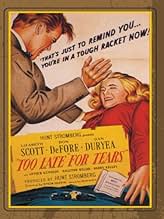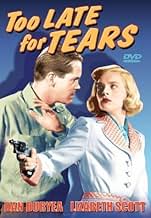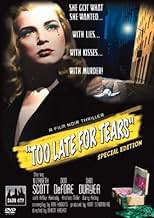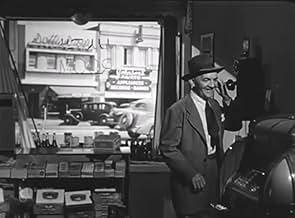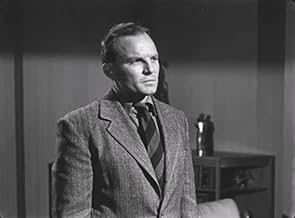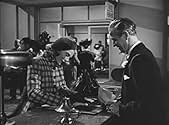CALIFICACIÓN DE IMDb
7.3/10
6.3 k
TU CALIFICACIÓN
A través de una circunstancia casual, una mujer despiadada se tropieza con una maleta llena de 60.000 dólares, y está decidida a aferrarse a ella aunque signifique un asesinato.A través de una circunstancia casual, una mujer despiadada se tropieza con una maleta llena de 60.000 dólares, y está decidida a aferrarse a ella aunque signifique un asesinato.A través de una circunstancia casual, una mujer despiadada se tropieza con una maleta llena de 60.000 dólares, y está decidida a aferrarse a ella aunque signifique un asesinato.
- Premios
- 2 premios ganados en total
Jimmy Ames
- Fat Man
- (sin créditos)
Georgia Backus
- Woman
- (sin créditos)
Robert Bice
- Policeman
- (sin créditos)
Paul Bradley
- Hotel Clerk
- (sin créditos)
John Butler
- Little Man Answering Phone
- (sin créditos)
David Clarke
- Jack Sharber
- (sin créditos)
Jimmie Dodd
- Second Car Thief
- (sin créditos)
Renee Donatt
- Young Lover in Boat
- (sin créditos)
Charles Flynn
- Policeman
- (sin créditos)
Billy Halop
- Boat Attendant
- (sin créditos)
Richard Irving
- First Car Thief
- (sin créditos)
Perry Ivins
- Checkroom Attendant
- (sin créditos)
Opiniones destacadas
Lizabeth Scott did her best remembered work in film noir (more than half of her only 21 screen credits fall within the noir cycle), and became one of its iconic faces. Rarely, however, was she called upon to play the fully-fledged femme fatale, and there's probably a reason for this: She couldn't bring off duplicity.
Her smile had no shadings into wry, or ironic, or smirky; it had but one setting a fresh, guileless grin that lit up like a Christmas tree. F. Scott Fitzgerald (in his sad screenwriting days) observed of Joan Crawford that you couldn't give her a simple stage direction like `telling a lie' because then she'd give an impersonation of Benedict Arnold betraying West Point to the British. But Scott can't manage even that, which results in confusingly mixed signals when her characters are motivated by malice, like Coral Chandler in Dead Reckoning: Her smile keeps convincing us that she's on the up-and-up.
Her damn smile keeps switching on in Too Late For Tears, even though there's no doubt that she's one hard, cold case. She and husband Arthur Kennedy are bickering one night en route to a party in the Hollywood Hills when suddenly a suitcase crammed with cash lands in their roadster. He wants to turn it over to the police, but she persuades him to think it over, so they check the valise at Union Station. When she starts buying clothes and furs against the checked capital, it's clear she has no intention of surrendering the windfall; we learn that her background was `white-collar poor, middle-class poor,' and that she'd made a previous marriage solely for money.
Strange men start ringing her doorbell. First Dan Duryea shows up, a blackmailer for whom the payoff was intended. He slaps her around playfully (`What do they call you besides stupid,' she taunts him. `Stupid will do if you don't bruise easily,' he purrs back). Quickly Scott maneuvers Duryea into helping him murder Kennedy but still won't tell him where the money's stashed. Though wary, he falls for her, starts hitting the bottle, and grows careless. Meanwhile, Kennedy's sister (Kristine Miller) harbors suspicions about his mysterious disappearance. When the next caller (Don DeFore) shows up, claiming to be an old Air Corps buddy of Kennedy's, she makes an alliance with him to find out what's really going on. And the claim ticket for the money keeps changing hands....
The plot is none too simple, and in consequence director Byron Haskin spends a lot of time trying to keep it clear rather than addressing some questions about character and logic that inevitably arise. Why did the avaricious, manipulative Scott marry Kennedy in the first (or second) place? Why does the sister live so conveniently close? How did Duryea, and for that matter DeFore, find Scott so easily? But few thriller plots are so tightly constructed that they survive rigorous analysis. Too Late For Tears passes muster as hard-boiled, late-40s noir and as one of Scott's hardest, strongest performances, inappropriate smile and all.
Her smile had no shadings into wry, or ironic, or smirky; it had but one setting a fresh, guileless grin that lit up like a Christmas tree. F. Scott Fitzgerald (in his sad screenwriting days) observed of Joan Crawford that you couldn't give her a simple stage direction like `telling a lie' because then she'd give an impersonation of Benedict Arnold betraying West Point to the British. But Scott can't manage even that, which results in confusingly mixed signals when her characters are motivated by malice, like Coral Chandler in Dead Reckoning: Her smile keeps convincing us that she's on the up-and-up.
Her damn smile keeps switching on in Too Late For Tears, even though there's no doubt that she's one hard, cold case. She and husband Arthur Kennedy are bickering one night en route to a party in the Hollywood Hills when suddenly a suitcase crammed with cash lands in their roadster. He wants to turn it over to the police, but she persuades him to think it over, so they check the valise at Union Station. When she starts buying clothes and furs against the checked capital, it's clear she has no intention of surrendering the windfall; we learn that her background was `white-collar poor, middle-class poor,' and that she'd made a previous marriage solely for money.
Strange men start ringing her doorbell. First Dan Duryea shows up, a blackmailer for whom the payoff was intended. He slaps her around playfully (`What do they call you besides stupid,' she taunts him. `Stupid will do if you don't bruise easily,' he purrs back). Quickly Scott maneuvers Duryea into helping him murder Kennedy but still won't tell him where the money's stashed. Though wary, he falls for her, starts hitting the bottle, and grows careless. Meanwhile, Kennedy's sister (Kristine Miller) harbors suspicions about his mysterious disappearance. When the next caller (Don DeFore) shows up, claiming to be an old Air Corps buddy of Kennedy's, she makes an alliance with him to find out what's really going on. And the claim ticket for the money keeps changing hands....
The plot is none too simple, and in consequence director Byron Haskin spends a lot of time trying to keep it clear rather than addressing some questions about character and logic that inevitably arise. Why did the avaricious, manipulative Scott marry Kennedy in the first (or second) place? Why does the sister live so conveniently close? How did Duryea, and for that matter DeFore, find Scott so easily? But few thriller plots are so tightly constructed that they survive rigorous analysis. Too Late For Tears passes muster as hard-boiled, late-40s noir and as one of Scott's hardest, strongest performances, inappropriate smile and all.
Made in 1949 this is one of those films that is a must for all noir fans. Do be warned though as this fell out of copyright some years ago and was widely duplicated – often very badly – but this is the restored version and is an absolute gem.
Late one night a couple are driving to a party that is far from inviting when a slow car tosses a bag into their open top car. The bag is choc full f cash. The wife is Jane Palmer (Lizabeth Scott) and she decides that she is going to hang onto the cash – despite what her husband wants. So she decides to convince him to keep it. He is cut from a different cloth and it soon becomes apparent how far she will go to keep it.
Now Lizabeth Scott is a show stealer here and that is even though everyone else is great too. She is so convincing as the manipulative and self centred vixen and I just loved it. As I said earlier watch out for poor copies or better still get the restored version. For those of you that love fashion, there are some timeless and elegant gowns on display here too and the men all wear zoot suits so you can't win 'em all. This is a must for all fans of the genre and one that has aged with style.
Late one night a couple are driving to a party that is far from inviting when a slow car tosses a bag into their open top car. The bag is choc full f cash. The wife is Jane Palmer (Lizabeth Scott) and she decides that she is going to hang onto the cash – despite what her husband wants. So she decides to convince him to keep it. He is cut from a different cloth and it soon becomes apparent how far she will go to keep it.
Now Lizabeth Scott is a show stealer here and that is even though everyone else is great too. She is so convincing as the manipulative and self centred vixen and I just loved it. As I said earlier watch out for poor copies or better still get the restored version. For those of you that love fashion, there are some timeless and elegant gowns on display here too and the men all wear zoot suits so you can't win 'em all. This is a must for all fans of the genre and one that has aged with style.
In Los Angeles, Alan Palmer (Arthur Kennedy) and his wife Jane Palmer (Lizabeth Scott) are driving to a party when a suitcase is thrown in the back seat of their car. When they open the suitcase, they find a large amount but they are chased by another car and they flee. Alan decides to deliver the money to the police, but Jane opposes and wants to keep it. So Alan decides to keep the suitcase with the money in a locker at the Union Station to decide what to do. A couple of days later, Jane spends a large amount in furs and other gifts for her. Then a man called Danny Fuller (Dan Duryea) comes to their apartment and Jane believes he is a detective and let him in; but soon she learns that he is also seeking the money. When Alan returns from his work and finds the shopping, he becomes upset and Jane does not tell anything about Danny. During the night, Alan and Jane go to a boat ride to make amends and she accidentally kills him with his pistol. Danny is forced to help her to dump the body in a lake and Jane reports to the police that her husband is missing. Her sister-in-law Kathy Palmer (Kristine Miller) that lives in the same floor snoops around Jane's apartment and finds the receipt of the locker. When she is sneaking out, she meets the stranger Don Blake (Don DeFore) that tells that is Alan's friend. Meanwhile Jane is seeking the receipt to get the money for her. Why the money was thrown to the backseat of the Palmer's convertible? Who will keep the money? Who are Danny and Don Blake?
"Too Late for Tears" is a great film with all the elements of the film- noir: there is the sordid motive, the femme fatale and many twists. This movie is probably one of the best roles of the gorgeous Lizabeth Scott. The DVD release by "Dark City" has a poor video that needs restoration. But it is worthwhile watching since the story is excellent. My vote is eight.
Title (Brazil): Not Available on DVD or Blu-Ray
"Too Late for Tears" is a great film with all the elements of the film- noir: there is the sordid motive, the femme fatale and many twists. This movie is probably one of the best roles of the gorgeous Lizabeth Scott. The DVD release by "Dark City" has a poor video that needs restoration. But it is worthwhile watching since the story is excellent. My vote is eight.
Title (Brazil): Not Available on DVD or Blu-Ray
No need to recap the convoluted plot. The movie's a sleeper among noirs, thanks mainly to an unpredictable and well thought-out screenplay from writer Huggins. Just when you think you've got things figured, you don't. I especially like the way Huggins subtly reverses Jane's (Scott) and Danny's (Duryea) competitive relationship. Watching the two circle each other is like watching two hungry sharks. Apparently, they want to mate but don't dare get too close. Note too, how effectively director Haskin uses the stylish wide-brimmed hats to veil the identity of men entering a room. I don't recall this clever effect in any other film. This is also one of the few noirs to make the central character a woman (Jane) instead of a man.
Then too, it's a very well cast movie. Duryea is of course Duryea, a major icon of noir. On the other hand, Scott was always more a presence than an actress. Still, her presence here is used to good effect as a greedy spider woman, even if she doesn't achieve much depth. But I especially like the underrated Don DeFore. His trademark nice guy is also used to good effect in what turns out to be something more than just a nice guy. (Be sure to catch ex-Dead End kid Billy Halop as the cranky boat manager.)
I guess the only missing element from classic noir are the angular shadows of moral ambivalence. Haskin does film a number of night scenes, but I don't spot the classic lighting. Perhaps that's because his specialty as a director was science fiction and adventure films. Anyway, I'm not sure why this withering little drama hasn't achieved more recognition. Maybe it's because it was an independent production without studio backing. But whatever the reason, the movie remains a gritty little noir worth catching up with.
Then too, it's a very well cast movie. Duryea is of course Duryea, a major icon of noir. On the other hand, Scott was always more a presence than an actress. Still, her presence here is used to good effect as a greedy spider woman, even if she doesn't achieve much depth. But I especially like the underrated Don DeFore. His trademark nice guy is also used to good effect in what turns out to be something more than just a nice guy. (Be sure to catch ex-Dead End kid Billy Halop as the cranky boat manager.)
I guess the only missing element from classic noir are the angular shadows of moral ambivalence. Haskin does film a number of night scenes, but I don't spot the classic lighting. Perhaps that's because his specialty as a director was science fiction and adventure films. Anyway, I'm not sure why this withering little drama hasn't achieved more recognition. Maybe it's because it was an independent production without studio backing. But whatever the reason, the movie remains a gritty little noir worth catching up with.
Jane and Alan Palmer accidently receive a satchel containing sixty thousand dollars that was intended as a blackmail payoff. Alan wants to turn the money over to the police, but money loving Jane wants to keep it. Meanwhile the blackmailer confronts Jane about his absconded payment. Greedy Jane murders her husband and then pretends to make a deal with the blackmailer. However, a ghost from Janes past returns to be her undoing.
Considering that Byron (WAR OF THE WORLDS) Haskin was never a really good director of actors, this film is very well acted. The cast turns in first rate performances, so good in fact that the performers almost make the viewer not notice that this film has a very far fetched, convoluted plot.
I have seen a lot of these "film noirs" and of all of them, TOO LATE FOR TEARS is probably one of the most cynical. Few other films I have seen have this thick air fatalism hanging over it.
Kristine Miller who plays Alan's sister Kathy, is one of the most beautiful women to grace the screen. This the first time I noticed her, and it's a shame her film career was rather short, and rarely had large roles as she had here.
One note: If you pay close attention, you will see former "Dead End" Kid leader Billy Halop in small role as a boat attendant.
Considering that Byron (WAR OF THE WORLDS) Haskin was never a really good director of actors, this film is very well acted. The cast turns in first rate performances, so good in fact that the performers almost make the viewer not notice that this film has a very far fetched, convoluted plot.
I have seen a lot of these "film noirs" and of all of them, TOO LATE FOR TEARS is probably one of the most cynical. Few other films I have seen have this thick air fatalism hanging over it.
Kristine Miller who plays Alan's sister Kathy, is one of the most beautiful women to grace the screen. This the first time I noticed her, and it's a shame her film career was rather short, and rarely had large roles as she had here.
One note: If you pay close attention, you will see former "Dead End" Kid leader Billy Halop in small role as a boat attendant.
¿Sabías que…?
- TriviaThe UCLA Film and Television Archive has remastered Lágrimas tardias (1949) from a recently discovered original print. The restoration process took five years after the print was discovered in France, and involved piecing segments of another copy into the restored version to have a complete film. The restoration was funded by the Film Noir Foundation. The restored version was broadcast on 7/17/2015, on the Turner Classic Movies network in pristine condition. The restored version of the film was released in 2016 on Blu-ray in the United States and the United Kingdom. The film has developed a cult following in the years since its release.
- ErroresJane tells Alan that the $790 she has spent represents about one tenth of a percent of the money in the satchel. Since they thought they had $100,000 (later determined by Danny the blackmailer to be $60,000). One tenth of a percent of 100,000 would be $100, so she spent closer to eight tenths of a percent of what she thought they had. A tenth of a percent of $60,000 would be $60, and $790 would be slightly over 1.3 per cent of that amount.
- Citas
Danny Fuller: Don't ever change, Tiger. I don't think I'd like you with a heart.
- ConexionesEdited into Your Afternoon Movie: Too Late for Tears (2022)
Selecciones populares
Inicia sesión para calificar y agrega a la lista de videos para obtener recomendaciones personalizadas
- How long is Too Late for Tears?Con tecnología de Alexa
Detalles
- Tiempo de ejecución
- 1h 39min(99 min)
- Color
- Relación de aspecto
- 1.37 : 1
Contribuir a esta página
Sugiere una edición o agrega el contenido que falta


